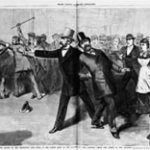Patients who had been tricked or forced into an insane asylum were seldom treated with compassion upon arrival. When Reverend Hiram Chase entered Utica Asylum (see last post), he was hustled to the third floor and searched by an attendant who took the bit of loose change Chase had carried in his pockets; Chase never received the money back. (Chase learned that it did not do to complain about attendants; doctors would not believe the patient, who would then be left at the mercy of the attendant’s wrath.)
Two or three hours after arrival, Chase had his supper–a hearty portion of both wheat and Graham bread. He also received a small piece of butter and a piece of gingerbread. His table mates on either side stole Chase’s bread, so that he did not get anything much to eat that night.
After supper ended and had been cleared and cleaned up, patients were sent to bed. Chase was not used to retiring while the sun was still up, but learned that patients’ wants gave way to the fixed routine of asylum life. Chase spent the night with four other patients who quarreled and raved the whole time.
In the morning, Chase managed to defend his breakfast, spoke with his ward doctor, and passed his time in growing dismay. On Friday, he had his first bath. The attendant locked the bathroom door, pointed to a tub in which “ten or twelve filthy maniacs had been scrubbed and washed with soft soap, until the water had become quite thick and disgusting to look upon,” Chase wrote, and told him to bathe in it. Re-using the water saved the attendants time and effort, and Chase had little choice in the matter.
Chase’s experience with attendants seems to echo a common theme of incompetence, tyranny and harshness, laziness, and disregard for their patients’ well-being.








